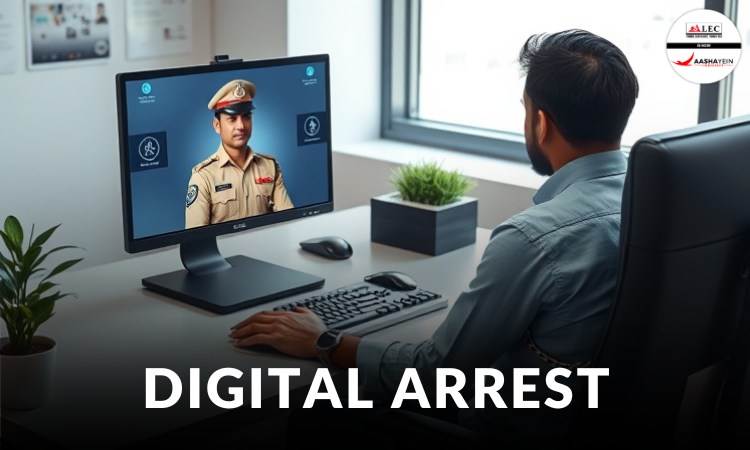To enhance the fear of cyber scams, a new scam has emerged recently that targets the victims for monetary or identity reasons in the name of government officials. For individuals who fall prey to it, it's a concerning trend that can result in both emotional and financial hardship.
understanding the digital arrest scam
A digital arrest scam is a type of cybercrime where scamsters pose as law enforcement or government representatives and call or video call victims. Scammers use digital arrests to threaten and demand money from victims, frequently by saying that the victim has committed a crime or that a family member is engaged in unlawful activity.
You can also read the latest judgment by visiting [Latest Judgment]
For more information, visit [Aashayein Enquiry Section]
Modus operandi of the scam
In the current times, the gap between law enforcement agencies and the general public has broadened so much that it gives birth to scams like this. The common mass is completely unaware of the mechanism used by these lawful agencies and the advantage of this gap is taken by scamsters. The modus operandi of these scams include-
- Fake calls
The first step to conclude this scam is using a fake number to call the victim and convincing him to shift to video call to authenticate that it's him only. They use various platforms like video calls on Skype, WhatsApp, or other platforms, to increase the authenticity of the call.
- Fear technique
During the video call, victims are shown fake documents or videos with backgrounds that look like police stations to make the threat seem real. The scammers use harsh language, falsely accusing the victims of serious crimes and threatening jail, asset seizure, or worse if they don't cooperate.
- Isolation strategy
During the video call, the victim is asked not to contact any person and is isolated from the public. The scamsters even ask to show the surrounding environment on the video call to make sure that the victim is all alone. Some scammers even use deepfake videos or fake arrest warrants to make their impersonation more convincing, tricking victims into thinking they are being watched. Further, the usage of loud voices to intimidate the victim is also common during such activity.
- Monetary demands
The main goal of these scams is generally the monetary aspect and once the scamsters are convinced that the victim is enough intimidated and alone they demand money to get relief from this. Scammers typically demand immediate payments through untraceable methods such as cryptocurrency, gift cards, or wire transfers. Often, they will also request sensitive details like Aadhaar numbers, bank information, and personal credentials, leading to further identity theft and financial exploitation.
- Common storyline
It has been seen that the common storyline behind such arrests is which includes illegal substance spotted in the parcel, involvement of a family member in any criminal activity, usage of a mobile number or Aadhar number for any illegal activity, or involvement of the victim in any financial fraud which needs to be investigated immediately.
How to recognize digital arrest scams
To prevent falling for digital arrest scams, it's critical to remain vigilant during video calls. An unprofessional setup is one red flag; scammers may utilize fictitious backgrounds that resemble law enforcement agencies, which appear dubious upon closer examination. Inconsistent details regarding the caller's identity or the purported incident should also raise suspicions because they may be signs of fraud.
Fraudsters may also display fictitious documents, such as fake identification or court records. To avoid fraud, always confirm them with official sources. Throughout the call, keep an eye out for manipulative tactics like emotional blackmail or threats of monitoring to coerce you into cooperating.
Legal efforts to counter the scams
To counter the growing cases of these scams, recently, “cyber dost” the cyber security initiative of the Ministry of Home Affairs released a public advisory which states that “no law enforcement agencies, such as the CBI, police, customs, ED, or judges, make arrests via video calls.” Further, The Indian Cybercrime Coordination Centre (I4C), working with Microsoft, has blocked over 1,000 Skype IDs involved in scams. To inform the public, awareness campaigns have been launched. Additionally, the government has created an inter-ministerial committee to address international cybercrimes targeting Indians. If someone receives a suspicious call, they should promptly report it to the cybercrime helpline at 1930 or visit http://www.cybercrime.gov.in and also file a report with local police.
Safeguards in case you have been a victim of such scams
In case a person has become a victim such an exam the first step to be taken by him should be to contact his bank and immediately freeze the account and ask for any action reversal if possible. Further, a formal complaint should be lodged with your city’s cybercrime police department and online on the National Cyber Crime Reporting portal as soon as possible.

